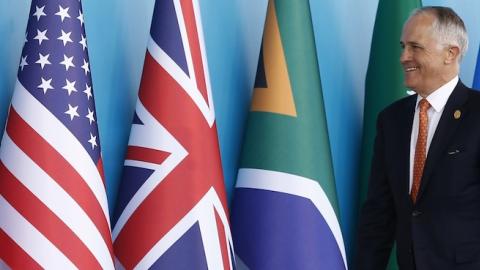Malcolm Turnbull, Australia's newish prime minister, will meet Japanese counterpart Shinzo Abe in Tokyo on Dec. 18, following an exchange they held on the side lines of the G-20 summit in Antalya, Turkey, in November. The lack of any lead-up to Friday's meeting, and the fact that Turnbull will be in Japan for less than a day, might cause some to dismiss it as an uninteresting meet-and-greet between the leaders of two friendly nations.
In fact, there is much riding on this meeting. Having replaced Tony Abbott as prime minister in September, Turnbull has been facing questions whether he shares Abbott's enthusiasm for Japan to play a bigger regional role.
If Turnbull comes away with a positive view of Abe and Japan's strategic policy, it is likely to improve chances that Canberra will select Japan, rather than France and Germany, as its supply contractor for Australia's new submarine fleet. Turnbull will seek advice from Marise Payne, his hand-picked defense minister, and the country's senior national security officials. But the decision will be ultimately taken by him. Such a submarine partnership could have lasting strategic significance for the entire region.
When Abbott first met Abe in October 2013, he said Japan was "Australia's best friend in Asia." It was no throwaway line. In addition to offering his strong support for Abe's active strategic agenda, Abbott made no secret of his desire to replace the aging fleet of Australia's locally-made Collins Class submarines with a Japanese-designed model based on Soryu-class vessels.
Cautious support
For Abbott, this would have killed two birds with one stone. Buying Japanese would offer Australia the best diesel-powered submarine in Asia and perhaps the world. It would allow the Royal Australian Navy to play a more muscular role in Southeast Asia in addition to remaining the local naval hegemon in the South Pacific.
Washington indicated to Canberra that the Japanese submarines could be fitted with U.S. weapon systems with minimal technical, operational or legal obstacles. This meant selecting the Japanese option would bind the future of the $37 billion Australian Submarine Project, the country's biggest ever defense project, to both the existing U.S. alliance and a deepening strategic partnership with Japan. The proposed deal left no one in doubt that Abbott was prepared to double down on support for the U.S.-led alliance system in Asia.
Offering Japan's naval "crown jewels" to Australia also made good sense to Abe. It represented a perfect start for Japan to play a more active regional strategic and military role. The largest export of military equipment and technology abroad in seven decades by the country would make a compelling statement about the return of Japan's strategic relevance.
Most of East Asia has been cautiously supportive of the deepening Australia-Japan relationship. Many countries are nervously watching to see whether the region's U.S. allies are willing and able to assume a greater share of the strategic and military burden as China rises. Japan and Australia have the two most capable navies in East Asia after the U.S. and China. If the budding partnership between Tokyo and Canberra is not quite enough to alter the balance of power in the region, it at least complicates any Chinese plans for strategic and military dominance.
Turnbull has been unfairly criticized by some Australian media for being "pro-China," based solely on the fact that he has a Chinese-born daughter-in-law. However, it is unclear whether he shares Abbott's wholehearted support for Abe's strategic agenda.
The Australian leader appears more comfortable speaking on economic matters as he attempts to hold up the crumbling pillars of Australia's commodity-dependent economy as China growth slows. He must call an election by the end of 2016. It is the economy rather than foreign and strategic policy that will decide the outcome.
Turnbull's advisers are telling him that the strategically important decision of who will supply the submarines must be made in the first half of 2016 when the government releases its Defence White Paper. Buying French or German submarines would be a safe and diplomatic option in the eyes of China, Australia's largest trading partner. But choosing Japan would be the bolder and more creative strategic choice.
Mutual interests
The Turnbull-Abe meeting is not likely to conclusively decide the submarine issue. But if the two leaders find they largely agree on strategic issues, this would be significant. Abe must sell his vision to the Australian leader and explain why a confident and can-do Japan increases the chances that China can be restrained -- if not peacefully integrated -- into the regional security architecture. The resilience and adaptability of the post-war alliance system, which has underpinned peace and prosperity since 1945, depends on it.
The meeting will provide some clues on Turnbull's approach. If he endorses the importance of Japan's strategic role in any post-summit remarks, it will indicate that he favors a constructive and bold regional policy, like Abbott, rather than a timid one.
Much of the region will refrain from commenting either way. But apart from China and North Korea, and possibly South Korea, which continues to have a vexed political relationship with Japan, the rest of the region will hope it is the latter.

















